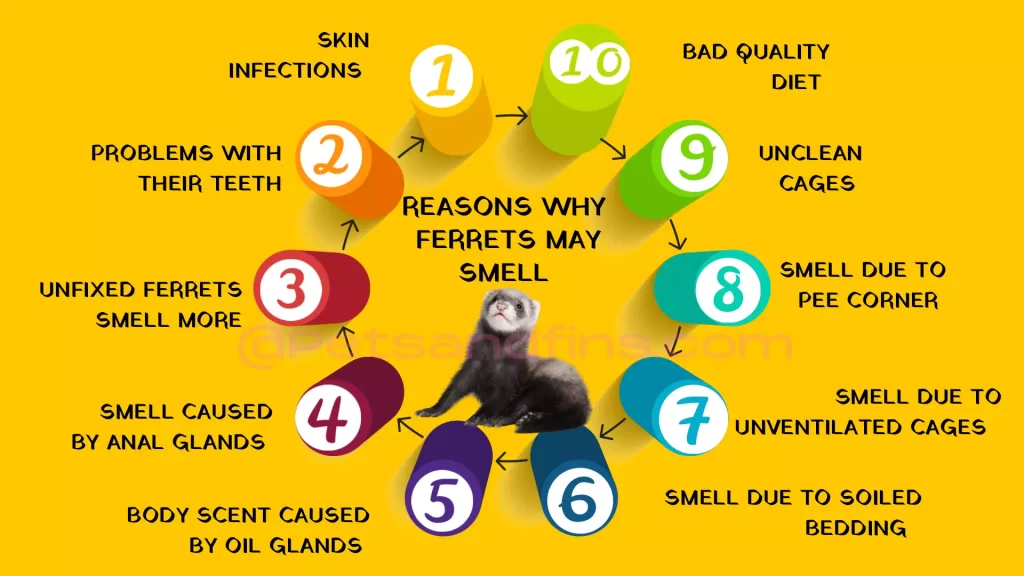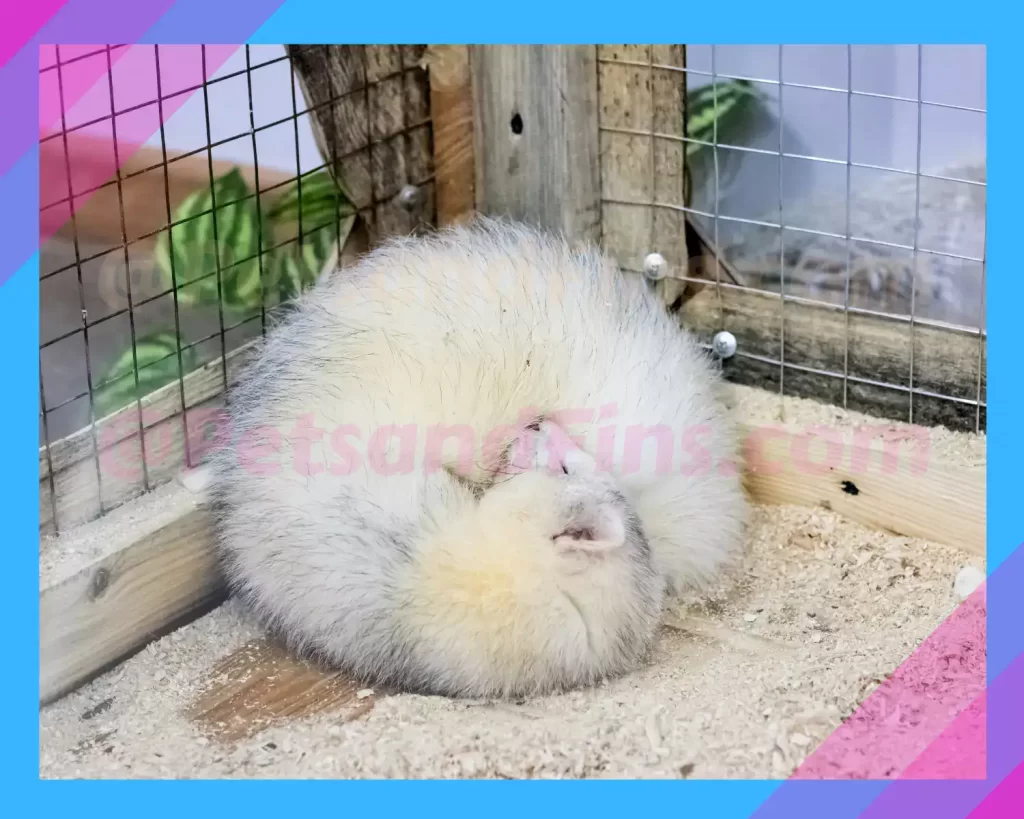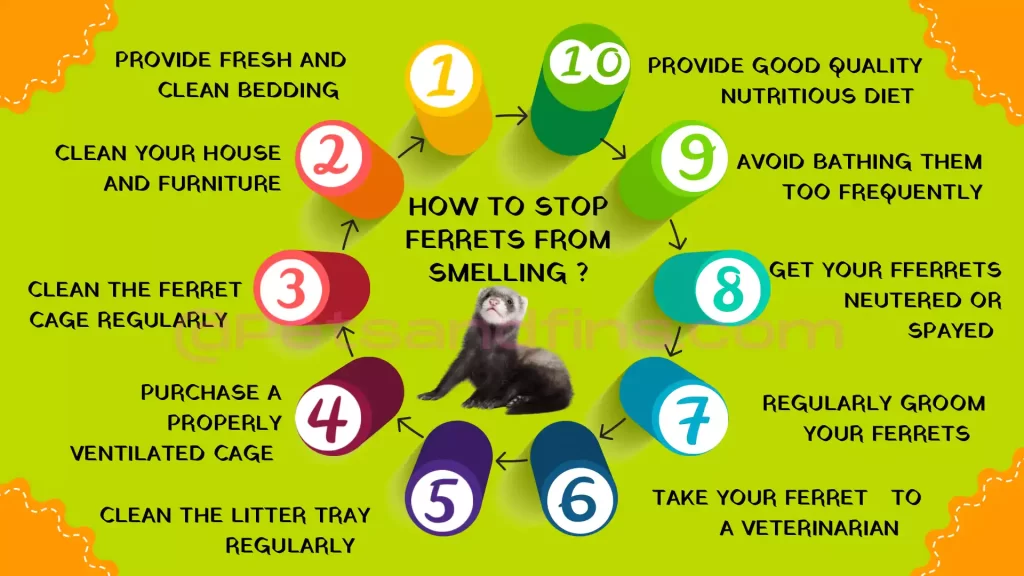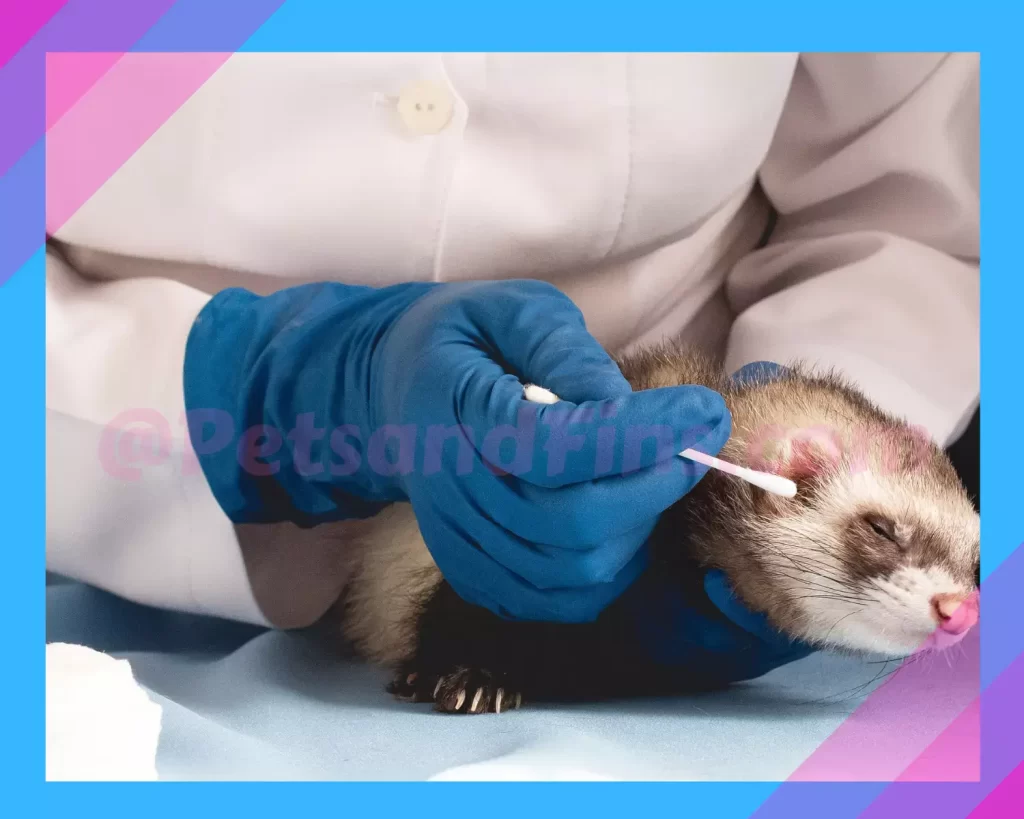Ferrets are great pets with a lot of personality. Do ferrets smell? Yes, they do- but it shouldn’t be too bad if you take care of them properly! Ferret odor can be caused by the ferret’s cage, food, or even the ferret himself.I am going to go over how to keep your pet’s scent fresh so that he doesn’t offend anyone or anything in his territory.
Ferrets are very misunderstood creatures, and ferret owners can’t help but be anxious about how they’ll react to their new pet. One of the most common concerns is whether ferrets smell bad. Ferrets have a natural musk that smells earthy.There is nothing that is unmanageable or intolerable.
The smell of ferrets is not an issue for most owners, but do keep in mind that the smell may be unpleasant to you. Males usually have a stronger musky odor than females, who are less smelly overall. There are many factors that contribute to the strong aroma your pet might give off, including stress or anxiety.

Ferrets are known for their scent glands, which produce an odor to mark territory or attract mates. The smell of the odor varies between different ferrets, but they all have some degree of it.
They have the ability to release the scent of their anal glands when they feel threatened or scared. It is important to keep your ferret clean and dry because this can help reduce odors being produced.
Why Do Ferrets Smell ?
Ferrets smell for a few different reasons. The smell of the odor varies between different ferrets, but they all have some degree of it. They also have the ability to release the scent of their anal glands when they feel threatened or scared.Let us check out a few of the common reasons why your ferret may be smelling.

Natural Body Scent Caused By Sebaceous Oil Glands:
Ferrets have a natural musk that smells earthy. This is caused by the oil glands located all over their body.This is what gives them their “ferret smell” and it’s completely natural for them.Ferrets do produce a scent, but it’s more of a musky kind of smell than anything else and for some people, it might be an unpleasant odor.
Sebaceous glands secrete an oily substance which can mix with dirt and create an unpleasant smell. This is why it’s important to keep your ferret clean and dry!
Ferrets are descended from tree-climbing mustelids with their musky oils secreted in glands in the skin, and can tell when other ferrets have passed through an area by their scent alone.
Smell Caused By The Anal Glands:
The anal glands are located on each side of the ferret’s anus and release a smelly secretion when the ferret is scared or feels threatened. This smell can be very strong and offensive, but it’s only temporary and will go away once the threat has passed.
The gland secretion contains compounds such as dimethylthietane, quinolone, etc. that create strong odors and give off a stench that smells similar to rotten onions!
You should also try to avoid getting him stressed out or threatened as much as possible, because this is when they’re most likely to release the scent.
This smell can be very strong and offensive, but it’s not something that happens all the time.
Unfixed Ferrets Smell More:
If your ferret isn’t spayed or neutered, it will likely smell more than those that have had the surgery. Male ferrets that have not been neutered yet or females that are in heat will produce a stronger, muskier scent than those who haven’t.
This is because unaltered ferrets have stronger sex hormones, which can cause them to produce more oil and create an even stronger scent.
The good news is that you can easily fix this problem by getting your pet fixed! It’s a quick and easy procedure that will not only help reduce odors, but it will also help keep him healthy in other ways as well.
If you’re planning on getting your pet fixed, it’s important to talk with your vet first and make sure they can perform the surgery safely- particularly if there is something wrong like adrenal disease (which causes weight loss and lethargy).

Smell Due To Problems With Their Teeth :
Having a cavity in your pet’s tooth is a sign that the tooth is decaying and that the pet is developing an infection in their mouth. Given that foul breath is one of the signs associated with dental problems, it is essential for pet owners to keep a close check on their pets.
Immediately seek veterinary attention if you find that your ferret has foul breath or drools more than normal.
When someone has significant oral health issues, such as rotting teeth or abscesses in their mouth, it is also possible for the gums surrounding their mouth and cheeks to become inflamed. This will cause them to drool, and they may even begin to seem to be in discomfort as a result of this.
If you observe that your ferret seems to be in discomfort when eating or yawning excessively, this might be one of the indicators of dental issues, and it is critical that ferret owners pay attention!
Smell Due To Skin Infections:
Ferrets are generally clean creatures, but their skin may get infected if they aren’t maintained correctly.
Scabs or scrapes on your pet’s body may be an indication of an infection in the region around their bite wounds, which is often where this sort of disease begins.It may also occur as a result of a struggle with another ferret in which they are attempting to establish dominance over one another.
If your ferret has a skin infection, this is caused by the animal’s body being infected with parasites, which cause irritation, a strong unpleasant odor, and pain in different regions of their body as a result of the infestation.
Mites and lice are examples of external parasites that reside on an animal’s coat, and they are a source of concern for many people. If you detect minute insect-like critters crawling over the surface of your pet’s fur, he or she may be suffering from a parasite infection, which may result in scabs and hair loss as well as other symptoms.
In terms of skin illnesses, ferret owners should be aware that they are extremely frequent in the species—particularly in those whose immune systems are compromised for whatever reason!
If your pet exhibits any of the symptoms listed above, or if they have a foul odor, you should take them to the veterinarian as soon as possible so that he or she may assess what sort of therapy your furry friend needs.
Smell Due To Ferret’s Diet:
Did you know that the food that your ferret consumes might have an impact on how it smells. Remember that if a person’s diet changes or if they consume new foods, their body may emit distinct scents as a result of this shift or addition of foods.
There are some meals that are bad for their health and may cause them to have an unpleasant odor as a result. Remember that feeding your pet unhealthy snacks may result in additional smells accumulating over time, as these foods are not beneficial to them in any way!
Before purchasing any snacks in the future, it is crucial for pet owners to check the labels carefully to ensure that the snacks are safe for their ferrets to eat.

Smell As A Result Of An Unclean Cage:
Did you know that if your pet’s cage isn’t cleaned on a regular basis, it might begin to create unpleasant odors? Your ferret’s environment must be cleansed on a regular basis to ensure that they do not develop any odors.
Is there a musky odor in the air? This may suggest that your ferret’s cage is not cleaned often enough, resulting in dust and filth accumulation over time. A buildup of these odors may create an unpleasant odor for the ferret and everyone else who comes!
Do not forget that soiled bedding materials may lead to ammonia accumulation, which produces a strong and unpleasant stench when they are exposed to the air.

If their home isn’t kept clean, then this could result in a bad odor coming from the room—which is why owners should take measures against having an unpleasant smell lingering around all of the time!
If you take care of these environmental elements by providing good living conditions such as a clean cage and fresh bedding, there will be no reason for your ferret to smell bad–and this means that you will have a healthy pet!
Food Left To Rot In Cage:
If your pet ferret smells, it’s possible that something is rotting away in his or her cage. If this is the case, it’s time to clean up the surroundings. If this isn’t addressed, additional insects will be drawn to the area, making the situation even worse.
If there are any remaining leftovers, they should be disposed of as quickly as possible to avoid the spread of flies and maggots in the surrounding area!

Smell Due To “Pee Corner”:
It’s important to note that the smell of ammonia is quite strong and unpleasant, and that a pee corner in the cage contributes to this. If your ferret pees in a certain spot, it might build up and create a nasty mess that emanates a foul stench when it is disturbed.
Considering that ferrets are creatures of habit, it is fairly common for them to choose a certain section of their home and designate it as their “pee corner.”
If there are any moist areas or strong scents emanating from them, there is a good likelihood that ammonia has accumulated there as well! As we all know, uric acid has a very terrible odor that persists for a long time due to the sticky structure of the substance.
It’s common for pet owners to underestimate how important it is to keep pee corners clean. This is because most people believe that cleaning up ferret cages involves removing all bedding material and scrubbing everything thoroughly–which is not always the case. Simply cleaning up the pee corner on a regular basis, every other day, should be adequate.

Smell As A Result Of Unventilated Cages:
Keeping your ferret in a tiny, unventilated room may cause ammonia levels to rise to dangerously high levels, according to the American Veterinary Medical Association.
Although it may be tempting to keep their cages in your bedroom or another section of the home where they’re more easily accessible, doing so is not a smart idea due to the buildup of odors that will result from them!
Unless there is sufficient air circulation, the scent from your pet’s urine will continue to create a strong stink, making it difficult to breathe for everyone else in the room.
Remember, if you do not provide enough ventilation, their habitat will lack fresh air and their conditions will rapidly worsen.
Another issue that might arise in low-quality or poorly ventilated environments is that excessive humidity and condensation can accumulate on the interior! This leads to the growth of nasty mold in a matter of seconds, and property owners should be aware of this.
Smell As A Result Of Soiled Bedding:
Are you aware of what occurs when there is no clean bedding available for your ferret? Unless there are shavings, hay, nuggets, or paper towels in the habitat, urine will collect, which leads to an accumulation of scents that will build up over time!
Remember that pet cages should always have a sufficient amount of bedding material within them in order to prevent any foul smells from emanating from them!

If you want to keep your ferret’s habitat smelling fresh, you might consider investing in good bedding materials that are absorbent and don’t let urine linger for an extended period of time.
Avoid using cedar or pine shavings since they might release gases that can irritate their respiratory systems–not to mention the pungent scent, which isn’t pleasant for anybody.
It is possible that some people may suggest that you use shredded paper, but this is not recommended since it will not absorb liquids fast enough and will gradually degrade into mushy messes after some time has passed. Additionally, if the paper has anything written on it, the ink may become irritating to your ferret’s skin and coat.

Steps To Prevent Your Ferret From Smelling:

- Clean The Litter Tray Regularly :
In addition to causing your home to smell terrible, an accumulation of feces and urine in a ferret’s litter box is likely to drive your ferret to defecate elsewhere in its cage. Although ferrets are known to be very clean, they don’t appreciate going to the bathroom in a filthy litter box.
Litter trays that are cleaned regularly are more likely to be used. Keep your ferret’s litter box clean every day to lessen the odor and ensure that your pet keeps using it.
- Purchase A High-Quality, Properly Ventilated Cage:
If you want to make sure that your ferret doesn’t smell, you need to invest in a high-quality habitat with proper ventilation. A well-ventilated cage will keep ammonia levels down and fresh air circulating, preventing the growth of harmful bacteria and mold.
Make sure that your ferret has plenty of space to run around and play in its habitat, as this will help cut down on bad odors. If there’s nowhere for them to hide or play, they may start marking their territory more frequently out of boredom, which will only exacerbate the problem.
A good way to increase ventilation is to place an air purifier near the cage, directing it towards it. This will create a constant flow of fresh air and prevent any noxious fumes from accumulating.
Remember that you should never place your ferret’s habitat directly in front of an open window since this may cause it to overheat!
- Clean The Ferret Cage Regularly:
It’s also important for pet owners to keep their cages clean at all times and replace soiled bedding materials frequently! This will go a long way toward preventing any odors from forming over time.
Once a month, thoroughly clean your ferret’s cage. The oils secreted by the ferrets’ skin glands will also adhere to the cage, giving it an unpleasant odor. This stench may be reduced by cleaning or washing the cage once a month.
- Clean Your House And Furniture:
Because ferrets are designed to move for hours in a day, it’s likely that their skin oil glands may get up on your carpets, furniture, and even the ferrets’ toys. Get your carpets cleaned, vacuum the floors, wash the toys, and keep your home clean in general to lessen the odor. Keep in mind that ferrets are very sensitive to chemicals, and if you use any harsh chemicals, it might injure their respiratory systems.

- Provide Clean And Fresh Bedding:
If you want to keep your ferret’s habitat smelling fresh, you might consider investing in good bedding materials that are absorbent and don’t let urine linger about for an extended period of time.
Every week, clean the ferrets’ bedding and blankets. The stink in your home will be significantly reduced if you wash and replace their blankets on a weekly basis (with natural, chemical-free detergent).

- Provide a Nutritious Diet of Good Quality:
A poor diet will not only make your ferret unhealthy, but it can also lead to bad smelling feces. A healthy and balanced diet is key to keeping your ferret’s digestive system running smoothly- which in turn means fewer smelly waste products!
Make sure that the majority of their diet consists of high quality proteins and fats. Avoid giving them processed foods, as these are likely to cause gastrointestinal problems and create smelly feces.
It’s important to feed your ferrets a healthy and nutritious diet. Ferrets that eat foods with lots of sugar and other additives will produce more oil on their skin than those who don’t. This leads to bad odors. If you want to keep your home smelling nice, it is best not to feed them any high-sugar treats at all!
- Avoid Bathing Them Too Frequently:
Keep in mind that frequent bathing can strip away the essential oils from their skin and fur, leaving behind an unpleasant smell – so bathe them only when it’s absolutely necessary! Do not bathe them more than once a month.
Although it is important to keep your ferret clean, giving him/her baths on a regular basis isn’t necessarily good for his health. In fact, excessive bathing will dry out its skin and this will cause the sebaceous glands to produce excessive oils, which in turn will make your ferret even smellier.
- Get Your Ferrets Fixed (Neutered or Spayed):
Ferrets that have not been fixed (spayed/neutered) are a major source of ferret odor. You’ll notice a considerable difference in the odor of your ferret after he or she has been repaired by a vet.

Fixing your ferret can do wonders in terms of reducing its odor. Ferrets that have not been spayed or neutered tend to smell more because they produce a stronger, muskier scent. When these ferrets are fixed, the production of this scent is considerably reduced, and this will make your ferret less smelly.
- Groom Your Ferret:
Make sure to keep your ferret groomed and free of any mats or tangles in their fur! Mats are a common culprit for trapping urine odors near the skin, so regular brushing is key to keeping them smelling fresh.Also ensure you clean your ferrets ears regularly. Unclean ferret ears can start to smell pretty bad.

- Take Your Ferret To A Veterinarian :
If your ferret is exhibiting any type of strange behavior or if you notice that he smells particularly bad, it’s important to take him to a veterinarian for a check-up. There could be an underlying medical condition causing the odor and only a professional will be able to diagnose and treat the problem.

There are many potential reasons why your ferret might be smelly, some of which can be easily fixed, while others may require more intensive veterinary care. If you’re concerned about your ferret’s smell, it’s best to take him in for a check-up so that you can rule out any health concerns.
A Word On Descenting Your Ferrets:
Some people choose to have their ferrets “descented” in order to reduce the amount of odor they produce. This is a surgical procedure that removes the anal scent glands from the animal’s body.
Although it may help to lessen the smell they produce from their anal glands, it is a major surgery and should not be taken lightly. If you are considering having your ferret descented, please speak with your veterinarian first to learn more about the risks and potential benefits involved.
It is also very important to understand that descenting your ferret will not greatly reduce the amount of musky order that comes from it. Descenting of your ferrets will only ensure that the secretion of the anal glands is greatly reduced. However, this will not get rid of the general musky smell that emanates from your ferret due to the sebaceous oil glands all over its body.

Many pet owners try to get their ferrets descented under the misplaced belief that this procedure will completely get rid of any smell from their ferret.
Most veterinarians and animal lovers across the world are against the concept of descenting of ferrets. It is looked at and frowned upon as a totally unnecessary procedure that can in fact harm your ferret by resulting in situations such as abscesses in the surgical area or even incontinence for the ferret.
Hence, think twice before you opt in for descenting your ferrets.
Wrapping Up
If you take some preventative measures and are diligent with cleaning, your ferret’s smell should not be too much of a problem. By following these simple tips, you can keep your home smelling fresh—even with a furry friend around!
Regularly changing bedding, cleaning cages thoroughly, feeding a nutritious diet, fixing and grooming your ferret will help minimize unpleasant odors and keep everyone happy and healthy!
XoXo
Genie
